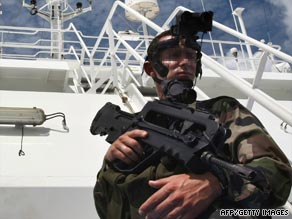Global pirate attacks on the increase
- Story Highlights
- Somali pirates accounted for 54 percent of all attacks this year
- Most of them took place off east coast of Somalia and in Gulf of Aden
- Somali pirates are still holding four ships for ransom
- Other trouble spots were waters off Nigeria, Malaysia and Bangladesh
CNN
(CNN) -- The first nine months of this year has seen more pirate attacks than all of last year. And more than half of those attacks were carried out by suspected Somali pirates, an international maritime watchdog group said Wednesday.

The increase in attacks has forced many countries to patrol pirate hotspots such as the Gulf of Aden.
"The increased activity in Somalia is the major reason for the spike," said Cyrus Mody, manager of the International Maritime Bureau, which monitors shipping crimes.
From January 1 until September 30, pirates worldwide mounted 306 attacks, compared with 293 in all of 2008, the Bureau said.
Of the incidents this year, Somali pirates accounted for 54 percent: they launched 168 attacks.
Most of them took place off the east coast of Somalia and in the Gulf of Aden, a major shipping route between Yemen and Somalia.
They successfully hijacked 32 vessels and took 533 hostages. Eight others were wounded, four more killed and one is missing, the Bureau said.
Somali pirates are still holding four ships for ransom with 80 crew members as hostages.
Somalia's transitional government, which has a tenuous grip on power, has been unable to stop the pirates -- many of whom are based in the port cities.
This has prompted Europe and other Western countries to step up maritime patrols.
Don't Miss
"In the Gulf of Aden, the number of attacks have gone up. But because of the presence of naval vessels, the success rate of the pirates have decreased," Mody said. "The navies are responding very very effectively."
Today's pirates are a far cry from the eye-patched, peg-legged swashbucklers of Hollywood. They don night-vision goggles, carry rocket launchers and navigate with global positioning devices.
Many pirates are trained fighters; others are young thugs enlisted for the job. Experts say they often sail out to sea in a mother ship and wait for a target.
When they find one, the pirates board smaller boats and move in, typically with five to seven armed hijackers per boat.
Two recent trends have led to a rise in piracy: access and opportunity.
As global commerce picks up, more and more of the world's fuels, minerals and other crucial commodities travel by ship. Ninety-five percent of America's foreign trade, for instance, moves by water, according to the U.S. Maritime Administration.
That cargo is an easy target for robbers in countries that lack the resources to secure their shorelines, such as Somalia.
Those who have tracked pirate activity say it started in Somalia in the 1980s, when the pirates claimed they were aiming to stop the rampant illegal fishing and dumping that continues to this day off the Somali coast.
Piracy accelerated after the fall of the Somali government in the early 1990s and began to flourish after shipping companies started paying ransoms.
Those payments started out being in the tens of thousands of dollars and have since climbed into the millions.
With the ransoms they collect, pirates can earn up to $40,000 a year, analysts say. That's a fortune for someone from an impoverished country.
Some analysts say companies are simply making the problem worse by paying the piracies.
"Yes, the ransoms have probably caused the piracy to become a bit more rampant. But at the same time, from the owner's point of view, there is no other way currently to secure the safe release of the vessel along with the crew and the cargo," Mody said.
"It's basically a cycle."
Other trouble spots this year were waters off Nigeria, with 20 attacks; Malaysia with 14; and Bangladesh with 12.

 Sit tight, we're getting to the good stuff
Sit tight, we're getting to the good stuff
